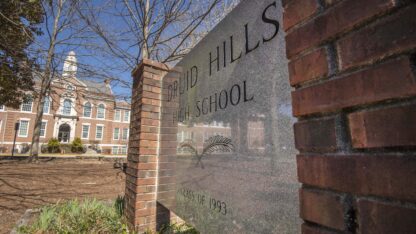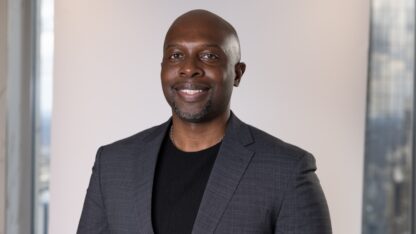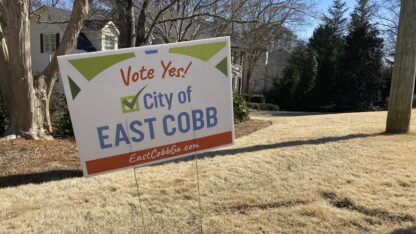Mayor khalid kamau is embracing South Fulton's identity as the Blackest city in America
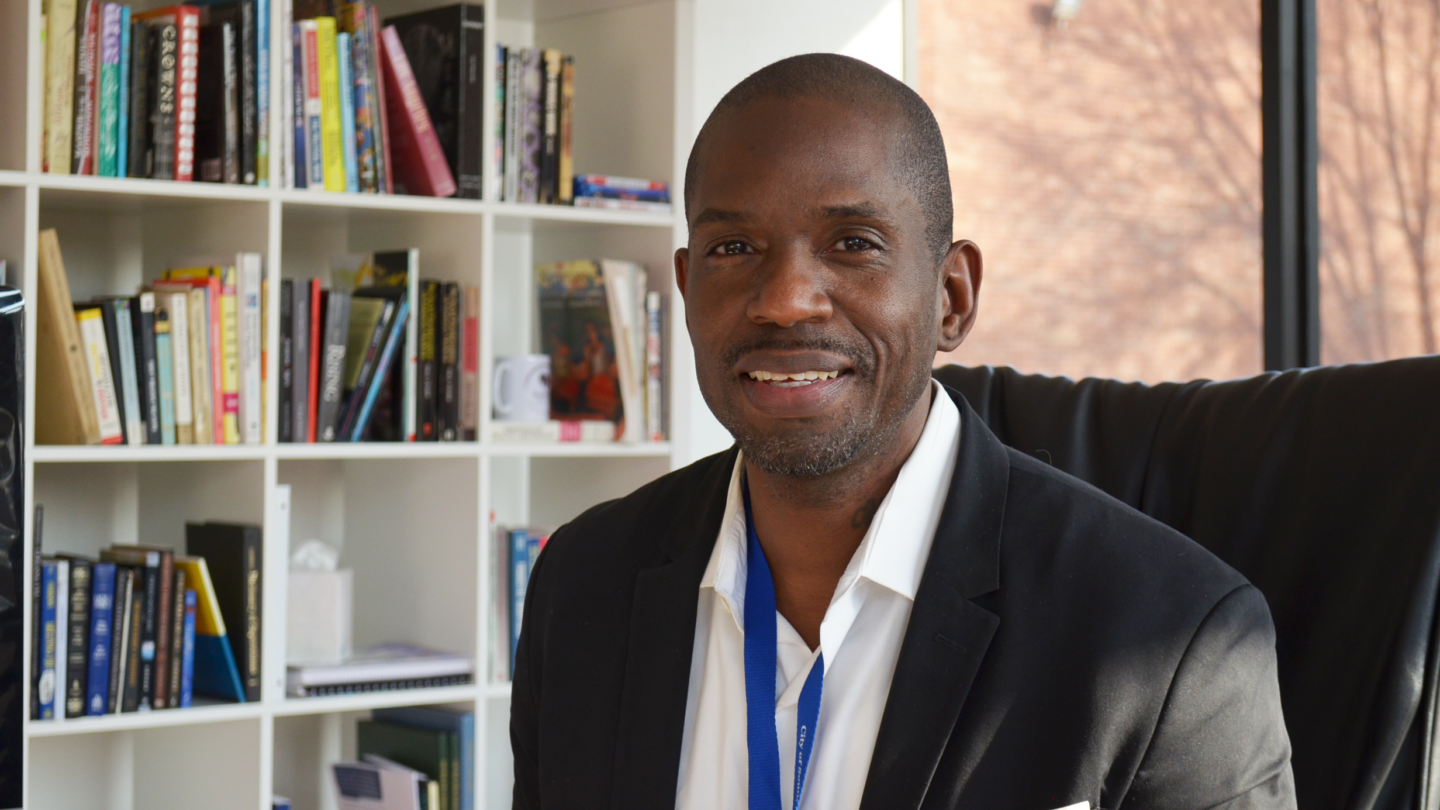
At the Southwest Arts Center on March 22, the City of South Fulton is having its monthly city council meeting. In the lobby, there’s live music, an art gallery and maps of the city that indicate council districts and the changes in state House and Senate districts. It comes together to create an atmosphere that differs from your typical city council meeting.
The city’s mayor, khalid kamau, likes to call this “edutainment.” These things were orchestrated by him to make sure that citizens are educated while bringing some fun and excitement to city government.
But this lively mood isn’t replicated inside the auditorium where the meeting takes place. There’s an air of tension on the stage, where the all-Black cast of kamau, the city council and city administrators are seated.
After discussion on whether or not to continue in-person council meetings, the council was hit with a barrage of criticism during the public comments. Some people accused the council of mismanaging money, a couple of people called the council corrupt and one person even referred to the council as the “gang of six.”
Kamau, who’s passionate about getting citizens engaged in local government, gave each comment his undivided attention.
“South Fulton could be a great city if you all could be great council people,” one woman told them.
South Fulton is the newest city in Fulton County to take on cityhood since it was incorporated in 2017. It’s also the Blackest city in the U.S. among cities with populations over 100,000 people, according to the 2020 Census. Nearly 92% of its residents are Black.
South Fulton’s identity as a Black city is something kamau wants to embrace fully. “Black On Purpose” is a phrase coined by him referring to the types of policies he wants the city to push — ones that intentionally improve Black people’s lives.
Being “Black On Purpose” is key in his vision for the city: a highly educated citizenry and the best place to do Black business. But, getting past the growing pains of being a new city — and the Blackest city — won’t happen without having courageous conversations about identity, insecurity and purpose, he says.
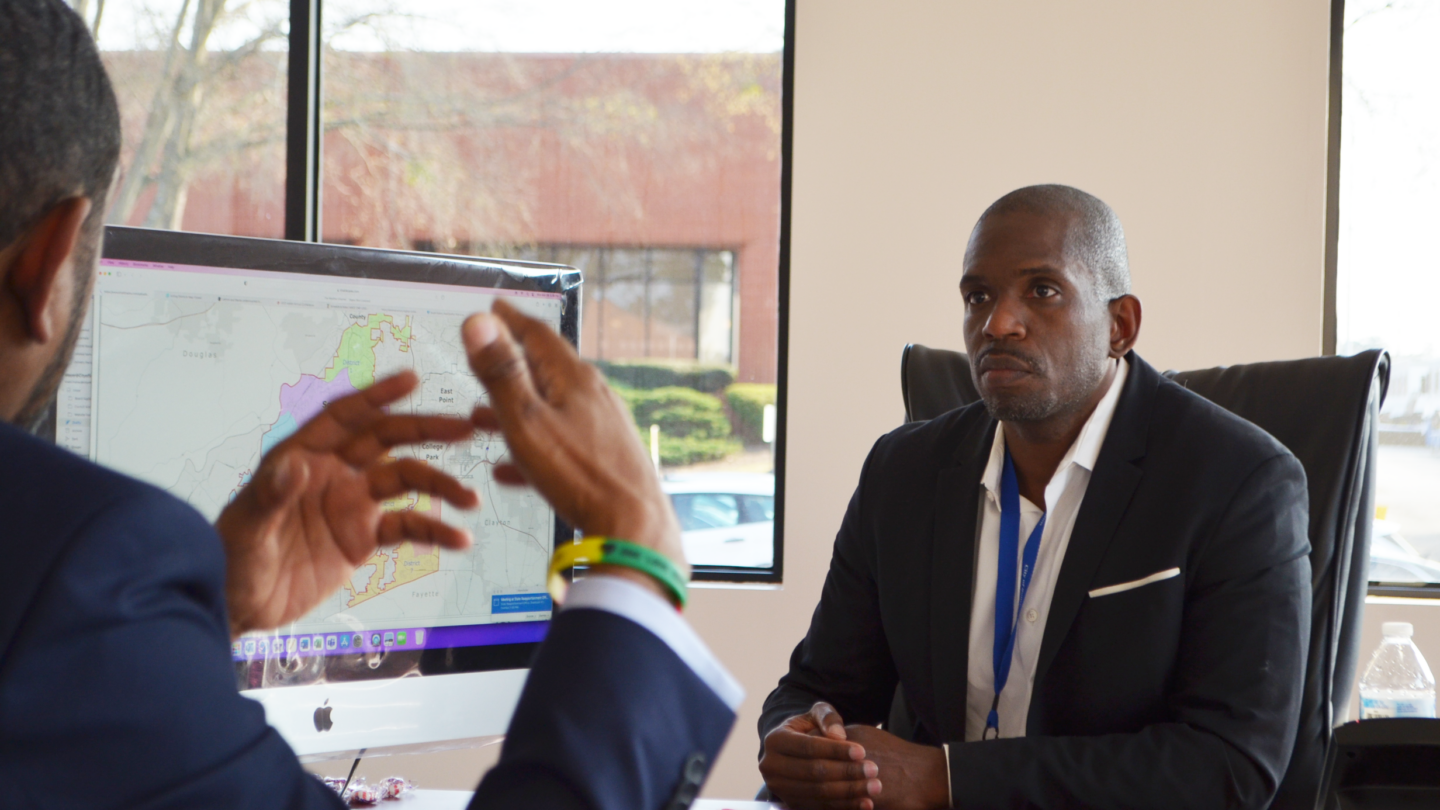
In the 2000s, when cities such as Sandy Springs and Johns Creek were incorporating on the north side of Fulton, valuable commercial corridors in unincorporated Fulton were being annexed by Atlanta and College Park on the south side. Over time, this left an increasingly smaller tax base for the county to provide services.
As the decade turned, kamau and other cityhood supporters felt that the south Fulton area was suffering from systemic disinvestment of money that was funneling to north Fulton.
South Fulton residents voted in favor of cityhood in 2016, but just barely had a majority.
Earlier that year, kamau helped found the Atlanta chapter of Black Lives Matter. By this point, he says the organization had a comprehensive platform that touched on housing, income inequality, restorative justice and more. At the time, members of the Movement for Black Lives were reluctant to get involved in electoral politics, but not kamau.
“…But this new city in the SWATS,” he recalls. “I was like, ‘This city is going to be super Black.’ And if there were ever a place, if there were ever a laboratory to test out all of these policies, the City of South Fulton is that place.”
He ran for council and was elected to represent District 6, making him the first Black Lives Matter organizer to be elected to public office in the U.S., according to kamau.
The City of South Fulton was officially incorporated on May 1, 2017. William “Bill” Edwards, formerly a Fulton County commissioner for 15 years, was elected mayor.
“Lots of people thought that a Black-run city would run itself into the ground, that we didn’t have the money or the resources to really survive as a city or that Black leadership would just mismanage things or devolve … and those fears, they rear their head all the time,” kamau says.
A rude awakening
In a nearly all-Black city, kamau assumed that without any racial discrimination, his time in the city government would be dull with only minor disagreements. He was in for a rude awakening.
Conflicts among councilmembers during the first administration made for a turbulent first few years of cityhood and a chaotic transition when kamau became mayor this year.
“I was surprised by how intense some of the battles for power were,” kamau says. “And I was shocked that there were people that were battling for power that didn’t really have a vision [and] they just wanted to be in charge. They didn’t seem to have a clear political agenda.”
He found some of the disagreements among city leaders to be necessary and normal in the early stages of forming a government. For example, arguments about power help choose the direction of democracy, he says, and to not have these fights is to stop the democratic process.
He compares the struggles of South Fulton to those that occurred in the play “Hamilton,” which portrays the conflicts among America’s early leaders during the American Revolution.
kamau has been passionate about political education ever since his time working with the Movement for Black Lives. In the organization, he was head of the political education committee. When South Fulton was first voted on and he ran for city council, he did what he could to educate citizens on why it became a city and what that means for everyone.
At the time, the city didn’t have a website or a Facebook page. So he turned his own website into an informational website for the city, which includes an extensive history of the city. Now, he does political education through newsletters, his YouTube channel and any other way he can meet people where they are. That includes going to local bars on Tuesdays where patrons can talk to him about the city.
“All these things to just try and get more people engaged and know that these decisions are being made right down the street from your house,” he says.
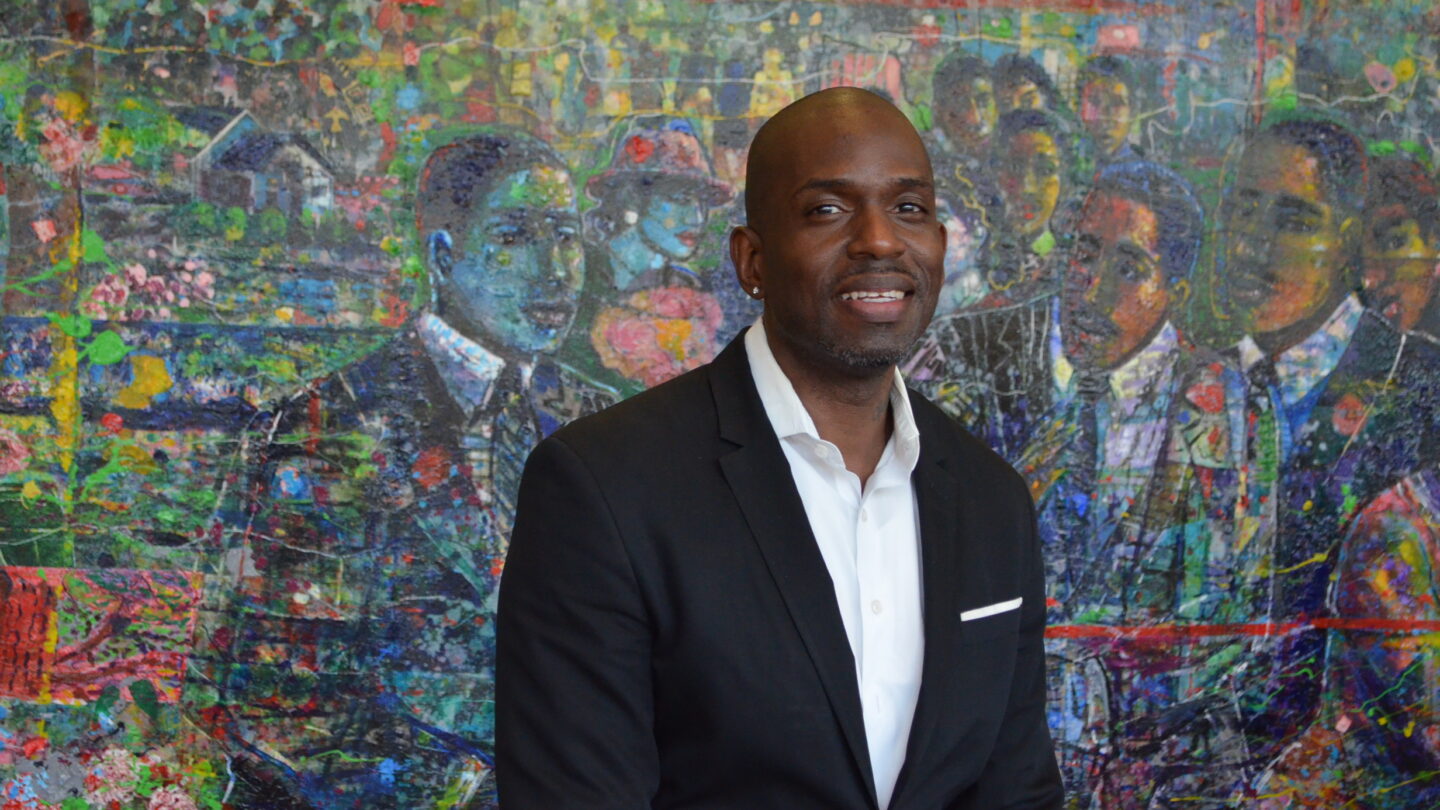
kamau is a proud native of Southwest Atlanta. He’s proud to have grown up in the same area as other famous entertainers like Kandi Burress and Ludacris. And he makes it known that when hip-hop artists refer to the SWATS or to Old National or Cascade in their songs, they’re talking about South Fulton.
“I really think that a lot of what distinguishes us from Atlanta is that a lot of what you hear about Atlanta being this Black Mecca and this center of Black excellence, a lot of that is actually South Fulton,” he says.
He was raised in a culture of service and civic awareness that undoubtedly impacted his life. After working for the Georgia House Democratic Caucus, he went on to lead the political education committee for the Movement for Black Lives. And, he became a Democratic Socialist and a member of the Working Families Party.
He credits those two organizations for being the mastermind behind many of the policies he’s put forth in South Fulton. His work as an organizer also made him sensitive to income inequality and inequity in policymaking.
“I’ve seen I see how disenfranchised communities [and] working-class communities get left out of policies and decision making,” kamau says.
“I really think that a lot of what distinguishes us from Atlanta is that a lot of what you hear about Atlanta being this Black Mecca and this center of Black excellence, a lot of that is actually South Fulton.”
khalid kamau
Although he’s the leader of the city, kamau is living in a community that is suffering from the same disenfranchisement that he’s trying to quell. He lives at the Camelot Condominiums, one of the most distressed complexes in the city. Underinvestment, infrastructure problems and crime have created harsh living conditions there.
He moved into the complex to fulfill a campaign promise made to Condia Perry, a longtime resident and member of the Camelot Concerned Residents Committee. (Also, renting a unit for about $800 per month there is within his means. As mayor, he makes a salary of $37,000.)
Initially, kamau told Perry he’d demolish Camelot. But that wasn’t the answer she was looking for, so she hounded him on the campaign trail advocating for improvements to Camelot.
Eventually, she brought him to visit Camelot and to talk to residents to get another perspective. He made the campaign promise that night to move in and do what he could to improve the conditions.
“And that next day after [he won], he called me and he said, ‘Okay, Miss Perry, I need someplace to stay,” she says.
At first, she says some residents were on “pins and needles” when they learned the mayor was going to be their neighbor. But the day after he moved in, he was already acquainted with his new neighbors and made them feel comfortable.
“Then the scuttlebutt was, ‘I talked to the mayor. He cool as hell,’” Perry says.
It wasn’t until kamau moved and began interacting with Perry regularly that she fully realized he’s someone committed to being present and accessible to South Fulton residents.
“If we all just give him a chance and really see what he’s doing and let him do what he needs to do, I think he’s really going to take the City of South Fulton to a totally different level,” she says. “I’m talking about from an economical standpoint, he’s going to bring some really good changes to the city.”
His time living at Camelot has given him a better understanding of what some of his constituents are going through.
“Those sorts of real stories, seeing children in Camelot, like walking in ditches without sidewalks to get to a MARTA bus or school bus, those are the things that remind me why I do this work and why I can’t give it up,” kamau says.
Bringing equity to South Fulton
kamau, a proud socialist, hopes he will leave a legacy of opening the minds of people to the ideas of socialism.
Some of the progressive legislation that’s been passed in the city includes: increasing the minimum wage to $15 per hour, abolishing Columbus Day in favor of Indigenous People’s Day, “banning the box” on job applications and making Election Day a city holiday.
“We are really showing that these sort of progressive policies — you don’t have to be in like Seattle or San Francisco, some uber-wealthy place to make these policies work,” he says. “[They] can work in working-class communities in the South.”
But ensuring equity in the city hasn’t been easy. It’s especially difficult, he says, with a council that struggles to embrace progressivism that involves redistributing wealth and opportunity.
One of the reasons residents voted for cityhood is because residents felt like south Fulton County was suffering from systemic disinvestment of money that was being funneled to north Fulton.
“I’ve seen I see how disenfranchised communities [and] working-class communities get left out of policies and decision making,”
khalid kamau
Now, kamau says South Fulton has become a microcosm of Fulton County because they’ve replicated that same north-south disinvestment.
For example, the city has made significant investments north of Roosevelt Highway, but there are no major buildings or investments below it.
South Fulton’s busiest business corridor, Old National Highway, is in the southern part of the city. It has the highest density of people, transit and businesses in South Fulton, but half of it doesn’t have sidewalks, he says.
“Not thinking comprehensively about how to make systemic improvements and ensure that we have equity in investments has been really detrimental to our city,” kamau says.
On his to-do list, kamau wants to overhaul the city’s zoning code, subdivision regulations and business permitting process to make sure that the benefits wealthier communities are enjoying get disseminated throughout the entire city. He also wants to create a Housing Authority to address housing inequity.
“It definitely [is] refreshing to hear someone who actually had an agenda that represents the poor and those who normally don’t have a voice in government and sincerely wanted to develop our neighborhoods, like the neighborhoods on the north side, like Johns Creek or Roswell, Alpharetta,” says Student Minister Stanley Muhammad, a friend and spiritual advisor to Kamau.
Muhammad say’s he grateful for Kamau and his policies that uplift Black people economically in America, where Muhammad feels Black people have been deprived of economic opportunities.
He adds that self-hatred is a problem among Black people in the community, and kamau is working to turn that around.
“Brother khalid is giving us a fresh look at our Blackness,” he says. “Making us see our blackness as a beautiful badge of honor. Then whatever he offers in his policies to our people to uplift them economically … Now we believe that we’re worthy.”
As the city approaches its fifth anniversary on May 1, the self-determination that led voters to vote for cityhood still exists in the “Black On Purpose” mission. kamau looks back on how leaders of the past purposefully made Atlanta a place for Black people to prosper.
“There were dozens of people from Maynard Jackson to Joseph Lowery, James orange, John Lewis … People planned and strategized and worked to make this a place where African Americans could prosper. And I think that’s been lost,” he says.
“It didn’t happen without people pushing and finally taking over the political machine to create conditions that allow the level of prosperity that we see,” he says.
kamau hopes that South Fulton can recapture that purpose.
“When you look at how Black people are faring in America, we are at the bottom of almost every socioeconomic indicator from housing to healthcare, from education to entrepreneurship and economic development,” he says. “I really do believe that a rising tide lifts all boats and if you can raise the boats at the bottom, the smallest boats, then everyone is going to benefit from that.”
